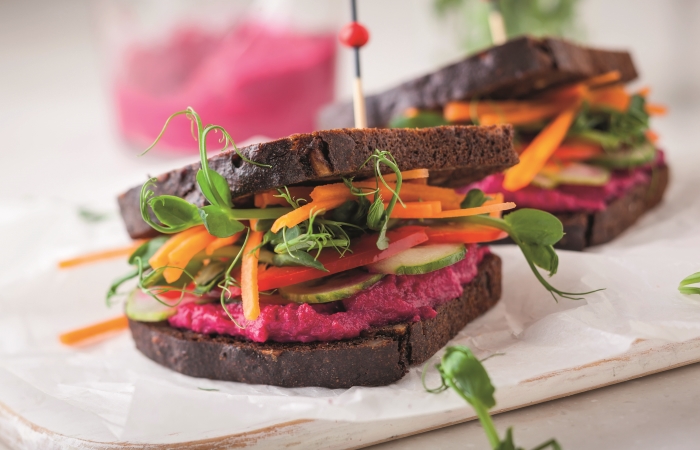Free at last
In Population Health
Follow this topic
Bookmark
Record learning outcomes
Gluten-free, wheat-free, dairy-free… the rise of free-from foods shows no signs of abating
Seen by many as being healthier, easier to digest, more environmentally-friendly and tastier than their regular counterparts, free-from foods continue to gain popularity. In fact, according to a Mintel report published in December 2017, the UK free-from market more than doubled in size between 2012 and 2017.

As a general trend, consumers are moving away from heavily processed food and drink and are often looking for products they perceive to be more natural, including those that are free-from.
Sales of these products are being driven by a number of factors, including media buzz, celebrity endorsements, better distribution and health concerns. Just under half of those who consume free-from products say they do so for health reasons, including weight loss, says Mintel.
But is the free-from fad really healthy, or could it be doing more harm than good?
What’s inside?
Many consumers believe that free-from foods, such as those without any gluten or dairy ingredients, can contribute to a healthy lifestyle. But actually, it’s a person’s overall diet that counts. In January 2018, a study conducted at the University of Hertfordshire revealed that gluten-free foods are no healthier than regular versions. The research, published in the February 2018 issue of the Journal of Human Nutrition and Dietetics, compared more than 1,700 food products and found that, with the exception of crackers, gluten-free foods contained more fat, salt and sugar than their gluten-containing equivalents and were lower in fibre and protein. The study also found that the gluten-free foods were 159 per cent more expensive than their regular food equivalents.
“Many interpret ‘free-from’ labelling as being free from something ‘nasty’ or ‘bad’ or ‘toxic’ – something that affects both food and cosmetics,” says Alex Gazzola, a health writer specialising in food sensitivities. “But when it comes to whether the food is healthier or more nutritious, it’s what’s in the product that counts, not what isn’t in there. Sadly, many gluten-free products are higher in sugar and fat and lower in vitamins and fibre than non-gluten-free equivalents, although this is improving.”
In the short term, it’s unlikely that unnecessarily following a free-from diet could cause any specific side effects or complications, but there is a risk that problems such as malnourishment and psychological issues could develop in the long term. Potentially serious symptoms could also be ignored. “There’s a risk that you could get into a spiral of removing foods from your diet to try to eliminate symptoms you perceive to be caused by food, but which may not be,” says Alex. “The more you eliminate, the more you risk malnourishment. I’ve spoken to enough dietitians in the past to know they are regularly having to ‘rescue’ people who’ve ended up in this cycle and have developed psychological issues with food, as well as nutritional insufficiency, weight loss, et cetera. People can get into a mess if they go it alone – you need the professional, objective support that only a trained dietitian can offer.”
Nutrient balance
In 2017, concerned that many teenagers and young adults were cutting out essential food groups, especially dairy products, the National Osteoporosis Society (NOS) launched a campaign to publicise the importance of healthy eating for strong bones. The charity’s main message was that everyone should eat a healthy, balanced diet that includes plenty of calcium, in all of its forms.
Dairy foods are higher in calcium than non-dairy sources and, according to the NOS, people who exclude dairy products need to eat other calcium-rich foods, such as pilchards, sardines, green leafy vegetables, almonds, sesame seeds, pulses, fortified soya drinks and bread with added calcium. The charity stresses that there is no evidence that vegetarians or vegans who don’t eat eggs or dairy products have poorer bone health than the rest of the population.
Diets for medical reasons

Some medical conditions, such as coeliac disease and lactose intolerance, can only be treated with a free-from diet. With others, such as irritable bowel syndrome (IBS), a free-from diet can be an important part of the management programme. Gillian Goddard, registered dietitian and diet adviser to The IBS Network, says that patients should be referred to the dietetic service by their GP once a diagnosis has been confirmed, so that dietitians can offer on-going support.
- Irritable bowel syndrome
Irritable bowel syndrome (IBS) affects around one in five people in the UK. The symptoms vary from person to person, but include bloating, abdominal pain, diarrhoea and constipation. Treatments include medicines to ease these symptoms, as well as psychological therapies, such as cognitive behavioural therapy (CBT).
IBS symptoms can be triggered by diet or lifestyle factors, including stress. Research has shown that in around 70 per cent of cases, a low FODMAP diet reduces the symptoms. FODMAPs (fermentable oligosaccharides, disaccharides, monosaccharides and polyols) are found in a variety of fruits and vegetables, as well as milk and wheat and some people find them difficult to digest.
The British Dietetic Association (BDA) says that a low FODMAP diet can be considered as second-line advice under the care of a dietitian. “The diet has to be well planned for any chance of success,” says Gillian. “It has a short-term elimination phase of four to eight weeks, and the reintroduction phase may take longer, depending on whether a patient reacts to the foods they are introducing. The third phase is the maintenance stage.”
- Coeliac disease
Coeliac disease is an autoimmune condition caused by a reaction to gluten – a protein found in wheat, rye and barley. Historically, coeliac disease was seen as a disease of the gut, but it is now known to be associated with other symptoms, including skin rashes, tiredness and neurological problems such as balance issues. It is difficult to diagnose and many people are initially treated as having IBS.
Coeliac disease treatment requires patients to stick to a gluten-free diet for life, to reduce short- and long-term health risks. “These days, food labelling legislation has made it easier for patients to stick to a gluten-free diet,” says Norma McGough, Coeliac UK director of policy, research and campaigns. “But they still need to learn to look carefully at lists of ingredients and also when they eat away from home. [Pharmacies] may be able to help customers access glutenfree staples, such as flour and bread, on prescription.”
- Lactose intolerance
Lactose intolerance occurs when the body is unable to digest lactose, a type of sugar found in milk, because their body is lacking in the enzyme lactase. It can cause abdominal pain, bloating and diarrhoea. Some people are born with lactose intolerance, while others may develop it after a bout of gastroenteritis. The symptoms usually develop within a few hours of consuming lactose-containing food and drink.
“Those with lactose intolerance will need to remove lactose from their diet,” says Gillian. “A structured reintroduction is required. Most people who have lactose intolerance manage to put some milk back into their diet in small quantities.”
According to the British Nutrition Foundation, there is some evidence that vegetarian diets have specific health benefits, as they tend to be higher in fruit and vegetables, whole grains and dietary fibre, while being lower in saturated fat and sugary foods. Vegetarian diets have also been linked to reduced blood pressure and blood cholesterol, as well as a lower risk of heart disease.
New research presented at the European Congress on Obesity in Vienna, Austria in May 2018 indicated that a plant-based diet lowers the risk of developing obesity in the long term. However, while plant-based, protein-rich foods such as beans, peas, tofu and soya tend to be higher in fibre and lower in fat, they can be lower in other nutrients than meat dishes. Therefore, pharmacy customers who eat a vegetarian or vegan diet may benefit from certain dietary supplements if their diet isn’t planned properly.
“Vegetarian means cutting out all meat and poultry as well as fish,” says Dr Carrie Ruxton from the Health and Food Supplements Information Service. “Most vegetarians still eat eggs and dairy foods, but their iron and zinc levels can be low. Going vegan means giving up all animal-sourced foods and drinks, including meat, fish, eggs and dairy. So the challenges to reach your recommended nutrient levels, especially for vitamins B12 and D, are greater and sourcing optimal amounts of nutrients from the diet alone is a challenge.”

Advice and diagnosis
If pharmacy customers believe they have a medical condition that would benefit from a free-from diet, such as coeliac disease, it’s important that they seek medical advice before cutting out any foods or food groups. “Coeliac disease symptoms often flare up and down, so aren’t always severe enough for people to make an appointment with their GP,” says Norma McGough, Coeliac UK director of policy, research and campaigns. “Customers may think it’s something they’ve eaten or that maybe they’re getting older. This is where pharmacists come in. Customers may ask a pharmacist what they can take for their symptoms or may even have been prescribed something. It is important to see if they are willing to have a screening test for coeliac disease.”
The diagnostic tests for coeliac disease only work if people are eating a gluten-containing diet. The general guideline is to eat some gluten in more than one meal every day for at least six weeks before any testing is carried out. “Once people have started a gluten-free diet, they may feel a lot better, but they need to be on a gluten-containing diet to be diagnosed in the first place,” explains Norma.
Vegetarian diets have been linked to a lower risk of heart disease
